Module 10 On the radio Unit 3 Language in use课件
文档属性
| 名称 | Module 10 On the radio Unit 3 Language in use课件 |  | |
| 格式 | zip | ||
| 文件大小 | 2.5MB | ||
| 资源类型 | 教案 | ||
| 版本资源 | 外研版 | ||
| 科目 | 英语 | ||
| 更新时间 | 2018-06-03 09:30:45 | ||
图片预览

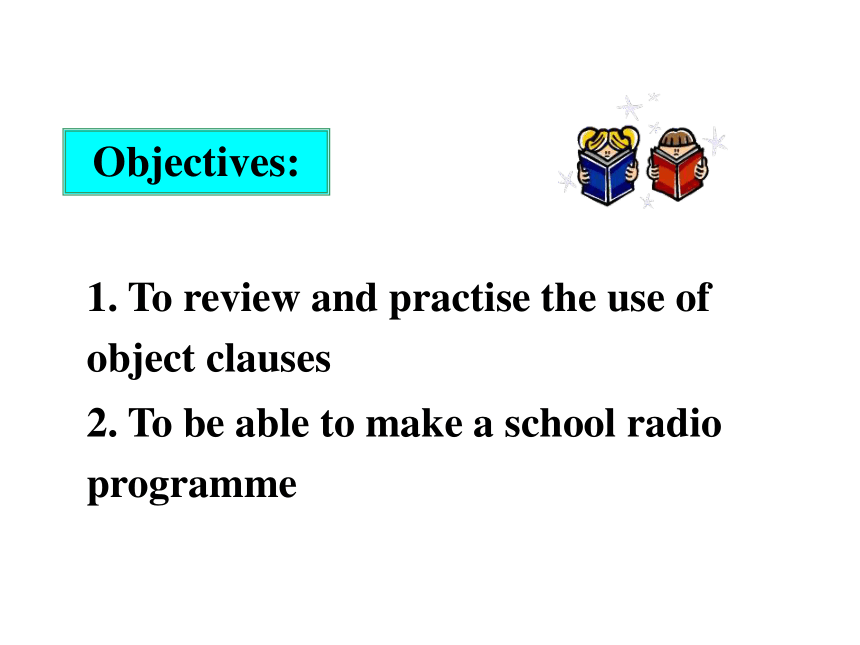

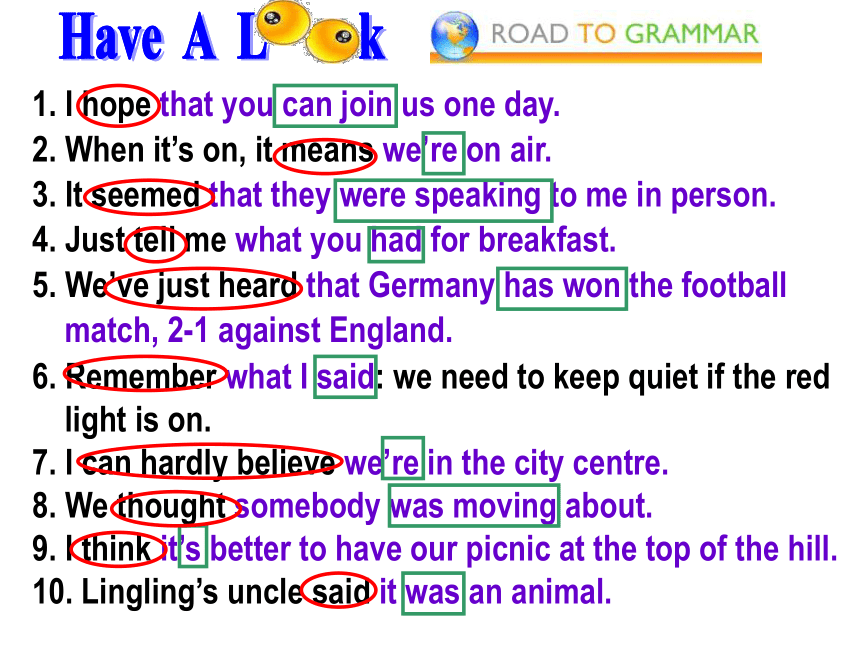
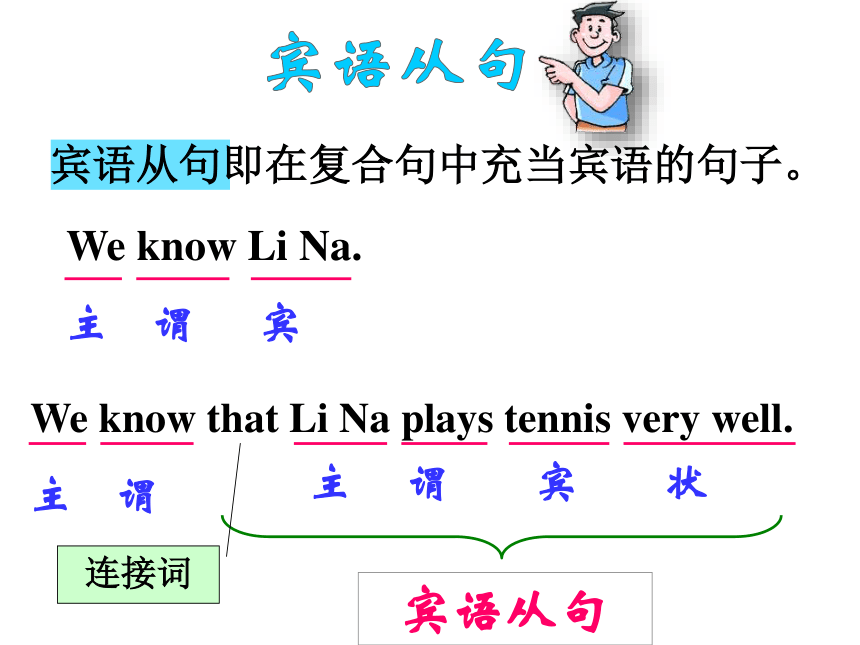
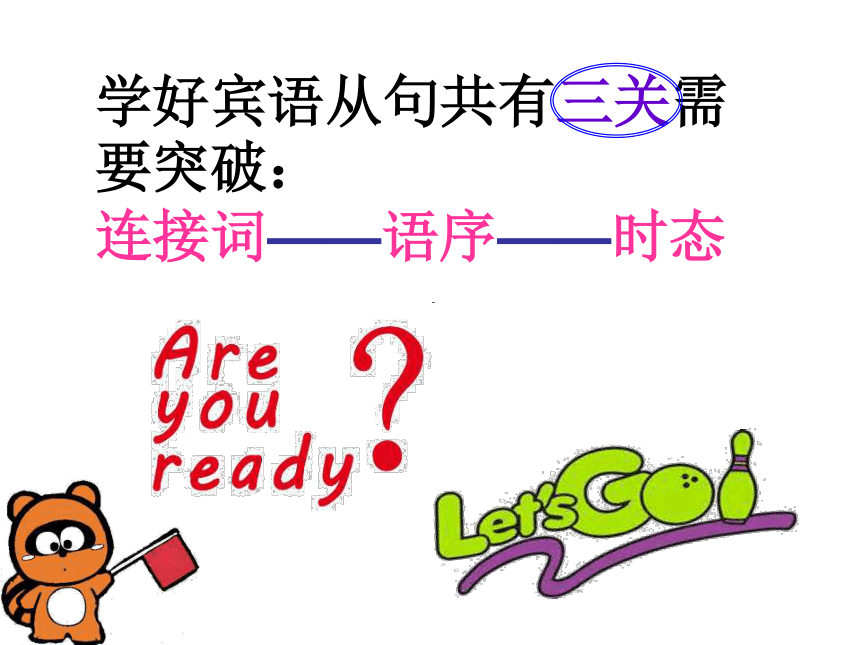
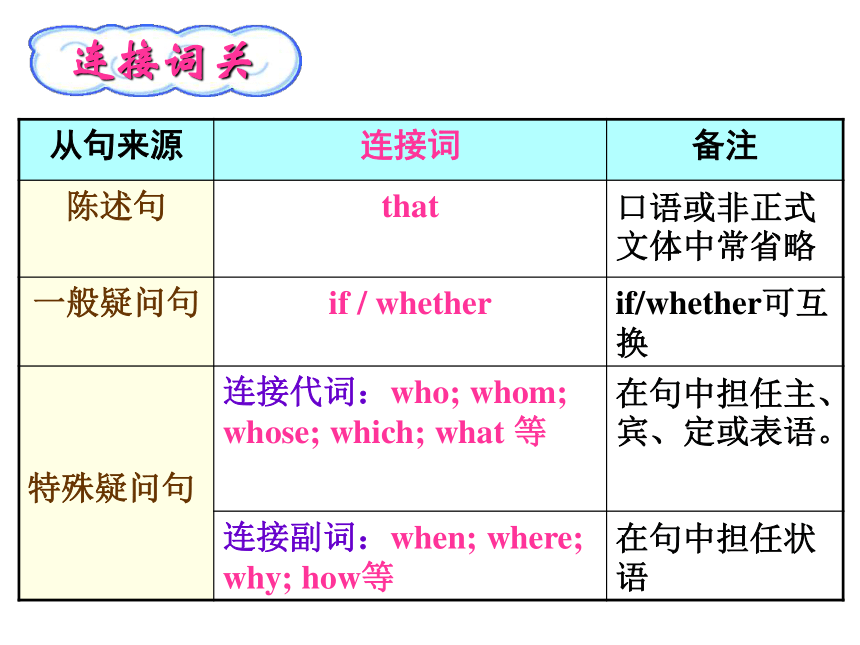
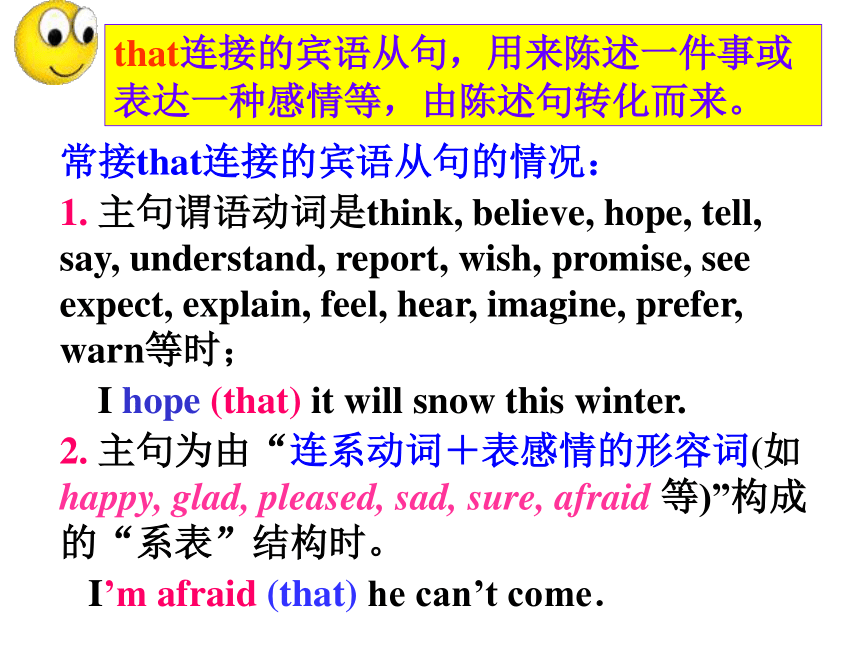
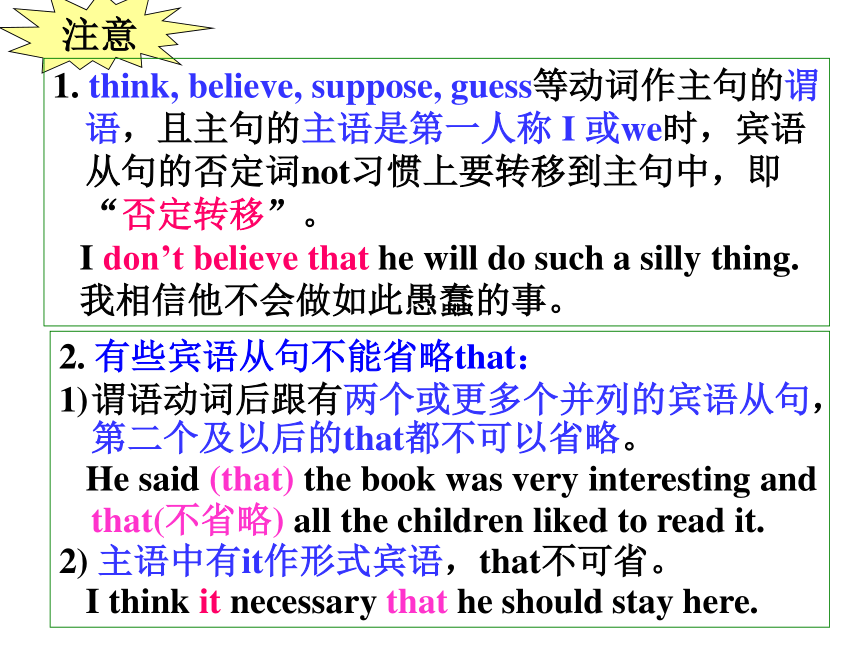
文档简介
课件21张PPT。Unit 3
Language in useObjectives:1. To review and practise the use of object clauses
2. To be able to make a school radio programme宾 语 从 句Review1. I hope that you can join us one day.
2. When it’s on, it means we’re on air.
3. It seemed that they were speaking to me in person.
4. Just tell me what you had for breakfast.
5. We’ve just heard that Germany has won the football match, 2-1 against England.
6. Remember what I said: we need to keep quiet if the red light is on.
7. I can hardly believe we’re in the city centre.
8. We thought somebody was moving about.
9. I think it’s better to have our picnic at the top of the hill.
10. Lingling’s uncle said it was an animal.宾语从句即在复合句中充当宾语的句子。宾语从句We know Li Na.
主 谓 宾We know that Li Na plays tennis very well.
主 谓宾语从句主 谓 宾 状连接词学好宾语从句共有三关需要突破:
连接词——语序——时态连接词关that连接的宾语从句,用来陈述一件事或表达一种感情等,由陈述句转化而来。常接that连接的宾语从句的情况:
1. 主句谓语动词是think, believe, hope, tell, say, understand, report, wish, promise, see expect, explain, feel, hear, imagine, prefer, warn等时;
I hope (that) it will snow this winter.
2. 主句为由“连系动词+表感情的形容词(如happy, glad, pleased, sad, sure, afraid 等)”构成的“系表”结构时。
I’m afraid (that) he can’t come.1. think,?believe,?suppose, guess等动词作主句的谓语,且主句的主语是第一人称 I 或we时,宾语从句的否定词not习惯上要转移到主句中,即“否定转移”。?
I?don’t?believe?that?he?will?do?such?a?silly?thing.?
我相信他不会做如此愚蠢的事。2. 有些宾语从句不能省略that:
谓语动词后跟有两个或更多个并列的宾语从句,第二个及以后的that都不可以省略。
He said (that) the book was very interesting and that(不省略) all the children liked to read it.
2) 主语中有it作形式宾语,that不可省。
I think it necessary that he should stay here.? if或whether连接的宾语从句,由一般疑问句转化而来,常放在 ask, see, know, wonder, find out 等动词/组后面。1. The old woman asked me if I knew the way to the hospital.
2. Nobody knows whether/if it will rain tomorrow.
3. He wondered if /whether he had given correct answers.
4. I’d like to find out whether I am blacklisted. 连接代词和连接副词引导的宾语从句是由特殊疑问句变化而来,要用陈述句语序。
常放在:see, say, tell, ask, answer, know, decide, find out, imagine, suggest, wonder, discover, understand, inform, advise等动词/组后面。1. They haven’t decided who will go there.
2. I?want?to?know?whom/who?you?are?waiting?for?
3. Have the police discovered whose the special shoes are? 1. He is an honest boy. The teacher said.
→The teacher said (that) he was an honest boy.
2. Does he work hard? I wonder.
→I wonder if/whether he works hard.
3. When did he leave? I don’t know.
→I don’t know when he left.语序关不论什么情况下,宾语从句都要用陈述语序,即“主语+谓语+其它”。时态关1. I hope that you can join us one day.
2. When it’s on, it means we’re on air.
3. Just tell me what you had for breakfast.
4. We’ve just heard that Germany has won the football match, 2-1 against England.
5. Remember what I said: we need to keep quiet if the red light is on.
6. I can hardly believe we’re in the city centre.
7. I think it’s better to have our picnic at the top of the hill.一般现在时一般现在时一般过去时现在完成时一般过去时一般现在时一般现在时当主句是现在时态时,从句可以根据实际情况采用任何时态。主句:一般现在时1. It seemed that they were speaking to me in person.
2. We thought somebody was moving about.
3. Lingling’s uncle said it was an animal.过去进行时过去进行时一般过去时主句:一般过去时 如果主句用过去时态,从句要用过去时态的某种形式。如果宾语从句表述的是客观真理、自然现象等时,不管主句是什么时态,
从句都要用一般现在时。如:
1. He said that light travels much faster
than sound.
2. Dad said that the sun is bigger than the earth. 注意:whyifwhohowwhenthat Complete the conversation with the words in the box. (P 84)how if that when who why2Summary宾语从句三要素:
连接词 that(陈述句)
if/whether(一般疑问句)
who; whom; whose; which; what
when; where; why; how(特殊疑问句)
时态 主句为现在时态,
从句可以是任何时态
主句为过去时态,
从句进行相应的过去变化
从句为客观真理,自然现象等,
则时态为一般现在时
语序 陈述语序Ⅰ. 根据提示改写句子。
These flowers are from Guangdong. He
said.
He said _____ these flowers _____from
Guangdong.
2. Light goes faster than sound. My teacher told me.
My teacher told me _____ light ______
faster than sound.注: word 文档
点击此处链接Quizthatwerethatgoes3. Can they speak French? I want to know.
I want to know ___ ____ ____ ______
French.
4. Are the children playing games? Tell me.
Tell me __ the children ____ _______
games.
5. What’s his name? I asked him. I asked him what ___ _____ ______.
6. Where did she put her car? Do you
know?
Do you know _____ ____ ____ her car?if they can speakifare playinghis name waswhere she putHomework1. Review the grammar we’ve learnt today.
2. Finish the exercises in Activity1and3 in Unit3.
Language in useObjectives:1. To review and practise the use of object clauses
2. To be able to make a school radio programme宾 语 从 句Review1. I hope that you can join us one day.
2. When it’s on, it means we’re on air.
3. It seemed that they were speaking to me in person.
4. Just tell me what you had for breakfast.
5. We’ve just heard that Germany has won the football match, 2-1 against England.
6. Remember what I said: we need to keep quiet if the red light is on.
7. I can hardly believe we’re in the city centre.
8. We thought somebody was moving about.
9. I think it’s better to have our picnic at the top of the hill.
10. Lingling’s uncle said it was an animal.宾语从句即在复合句中充当宾语的句子。宾语从句We know Li Na.
主 谓 宾We know that Li Na plays tennis very well.
主 谓宾语从句主 谓 宾 状连接词学好宾语从句共有三关需要突破:
连接词——语序——时态连接词关that连接的宾语从句,用来陈述一件事或表达一种感情等,由陈述句转化而来。常接that连接的宾语从句的情况:
1. 主句谓语动词是think, believe, hope, tell, say, understand, report, wish, promise, see expect, explain, feel, hear, imagine, prefer, warn等时;
I hope (that) it will snow this winter.
2. 主句为由“连系动词+表感情的形容词(如happy, glad, pleased, sad, sure, afraid 等)”构成的“系表”结构时。
I’m afraid (that) he can’t come.1. think,?believe,?suppose, guess等动词作主句的谓语,且主句的主语是第一人称 I 或we时,宾语从句的否定词not习惯上要转移到主句中,即“否定转移”。?
I?don’t?believe?that?he?will?do?such?a?silly?thing.?
我相信他不会做如此愚蠢的事。2. 有些宾语从句不能省略that:
谓语动词后跟有两个或更多个并列的宾语从句,第二个及以后的that都不可以省略。
He said (that) the book was very interesting and that(不省略) all the children liked to read it.
2) 主语中有it作形式宾语,that不可省。
I think it necessary that he should stay here.? if或whether连接的宾语从句,由一般疑问句转化而来,常放在 ask, see, know, wonder, find out 等动词/组后面。1. The old woman asked me if I knew the way to the hospital.
2. Nobody knows whether/if it will rain tomorrow.
3. He wondered if /whether he had given correct answers.
4. I’d like to find out whether I am blacklisted. 连接代词和连接副词引导的宾语从句是由特殊疑问句变化而来,要用陈述句语序。
常放在:see, say, tell, ask, answer, know, decide, find out, imagine, suggest, wonder, discover, understand, inform, advise等动词/组后面。1. They haven’t decided who will go there.
2. I?want?to?know?whom/who?you?are?waiting?for?
3. Have the police discovered whose the special shoes are? 1. He is an honest boy. The teacher said.
→The teacher said (that) he was an honest boy.
2. Does he work hard? I wonder.
→I wonder if/whether he works hard.
3. When did he leave? I don’t know.
→I don’t know when he left.语序关不论什么情况下,宾语从句都要用陈述语序,即“主语+谓语+其它”。时态关1. I hope that you can join us one day.
2. When it’s on, it means we’re on air.
3. Just tell me what you had for breakfast.
4. We’ve just heard that Germany has won the football match, 2-1 against England.
5. Remember what I said: we need to keep quiet if the red light is on.
6. I can hardly believe we’re in the city centre.
7. I think it’s better to have our picnic at the top of the hill.一般现在时一般现在时一般过去时现在完成时一般过去时一般现在时一般现在时当主句是现在时态时,从句可以根据实际情况采用任何时态。主句:一般现在时1. It seemed that they were speaking to me in person.
2. We thought somebody was moving about.
3. Lingling’s uncle said it was an animal.过去进行时过去进行时一般过去时主句:一般过去时 如果主句用过去时态,从句要用过去时态的某种形式。如果宾语从句表述的是客观真理、自然现象等时,不管主句是什么时态,
从句都要用一般现在时。如:
1. He said that light travels much faster
than sound.
2. Dad said that the sun is bigger than the earth. 注意:whyifwhohowwhenthat Complete the conversation with the words in the box. (P 84)how if that when who why2Summary宾语从句三要素:
连接词 that(陈述句)
if/whether(一般疑问句)
who; whom; whose; which; what
when; where; why; how(特殊疑问句)
时态 主句为现在时态,
从句可以是任何时态
主句为过去时态,
从句进行相应的过去变化
从句为客观真理,自然现象等,
则时态为一般现在时
语序 陈述语序Ⅰ. 根据提示改写句子。
These flowers are from Guangdong. He
said.
He said _____ these flowers _____from
Guangdong.
2. Light goes faster than sound. My teacher told me.
My teacher told me _____ light ______
faster than sound.注: word 文档
点击此处链接Quizthatwerethatgoes3. Can they speak French? I want to know.
I want to know ___ ____ ____ ______
French.
4. Are the children playing games? Tell me.
Tell me __ the children ____ _______
games.
5. What’s his name? I asked him. I asked him what ___ _____ ______.
6. Where did she put her car? Do you
know?
Do you know _____ ____ ____ her car?if they can speakifare playinghis name waswhere she putHomework1. Review the grammar we’ve learnt today.
2. Finish the exercises in Activity1and3 in Unit3.
同课章节目录
- Module 1 Feelings and impressions
- Unit 1 It smells delicious.
- Unit 2 I feel nervous when I speak Chinese .
- Unit 3 Language in use
- Module 2 Experiences
- Unit 1 I've also entered lots of speaking competi
- Unit 2 They have seen the Pyramids.
- Unit 3 Language in use
- Module 3 Journey to space
- Unit 1 Has it arrived yet?
- Unit 2 We have not found life on any other planet
- Unit 3 Language in use
- Module 4 Seeing the docto
- Unit 1 I haven't done much exercise since I got m
- Unit 2 We have played football for a year now
- Unit 3 Language in use
- Module 5 Cartoons
- Unit 1 It's time to watch a cartoon.
- Unit 2 Tintin has been popular for over eighty yea
- Unit 3 Language in use
- Revision module A
- Module 6 Hobbies
- Unit 1 Do you collect anything ?
- Unit 2 Hobbies can make you grow as a person.
- Unit 3 Language in use
- Module 7 Summer in Los Angeles
- Unit 1 Please write to me and send me some photos
- Unit 2 Fill out a form and come to learn English
- Unit 3 Language in use
- Module 8 Time off
- Unit 1 I can hardly believe we are in the city ce
- Unit 2 We thought somebody was moving about
- Unit 3 Language in use
- Module 9 Friendship
- Unit 1 Could I ask if you've mentioned this to he
- Unit 2 I believe that the world is what you think
- Unit 3 Language in use
- Module 10 On the radio
- Unit 1 I hope that you can join us one day
- Unit 2 It seemed that they were speaking to me in
- Unit 3 Language in use
- Revision module B
